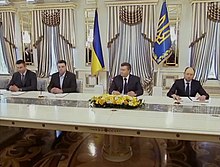
Back Dohoda o urovnání krize na Ukrajině Czech Vereinbarung über die Beilegung der Krise in der Ukraine German Ուկրաինայի քաղաքական ճգնաժամի կարգավորման մասին համաձայնագիր Armenian Соглашение об урегулировании политического кризиса на Украине Russian 关于解决乌克兰政治危机的协议 Chinese

The Agreement on the Settlement of the Political Crisis in Ukraine (Ukrainian: Угода про врегулювання політичної кризи в Україні, Russian: Соглашение об урегулировании политического кризиса на Украине) was an agreement signed on on 21 February 2014 by then-President of Ukraine, Viktor Yanukovych, and the leaders of Ukraine's parliamentary opposition, with mediation from the European Union and Russia. The agreement aimed to reduce bloodshed at the Euromaidan demonstrations in Kyiv, which had become significantly more violent during the Revolution of Dignity and resulted in the deaths of over 100 people. It also sought to end the political crisis caused by Euromaidan, which had began in November 2013 in response to Ukrainian authorities' decision to suspend the signing of the European Union–Ukraine Association Agreement.
The opposition was represented by Vitali Klitschko (of the Ukrainian Democratic Alliance for Reform), Arseniy Yatsenyuk (of the All-Ukrainian Union "Fatherland") and Oleh Tyahnybok (of Svoboda). The signing was formally witnessed by the Foreign Ministers of Germany and Poland, Frank-Walter Steinmeier and Radosław Sikorski, as well as the head of the Department for Continental Europe of the French Ministry of Foreign Affairs, Eric Fournier. Vladimir Lukin, the Special Representative of the President of the Russian Federation, participated in the discussions but declined to sign the agreement.[1]
The agreement called for a return to the 2004 Constitution, establishing a parliamentary-presidential system of government, early presidential elections by the end of 2014, and the formation of a "government of national trust". It also called for the removal of security troops from downtown Kyiv, a cessation of violence, and the disarmament of the opposition.[2]
Although nearly all sides, except Russia, signed the agreement, it was not implemented. Protests continued after its signing, and Yanukovych eventually fled to Russia. With the Euromaidan protesters emerging victorious, an arrest warrant was issued for Yanukovych, who effectively became a fugitive.[3]
- ^ "Лукин объяснил, почему Москва не подписала антикризисное соглашение". NewsRU.com (in Russian). 4 March 2016. Archived from the original on 4 March 2016. Retrieved 10 June 2023.
- ^ Yanukovych announced early presidential elections in Ukraine www.bbc.co.uk
- ^ "A 5-Minute Guide to Understanding Ukraine's Euromaidan Protests". www.opensocietyfoundations.org. Retrieved 2 February 2023.
© MMXXIII Rich X Search. We shall prevail. All rights reserved. Rich X Search